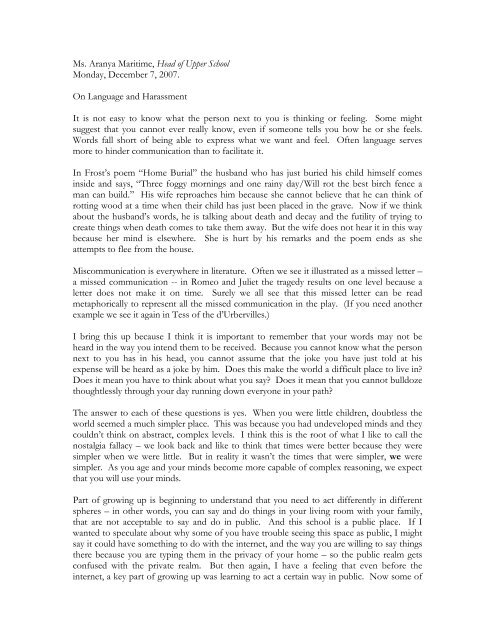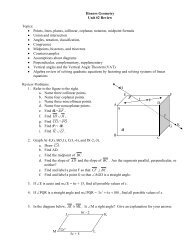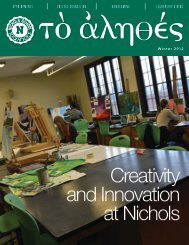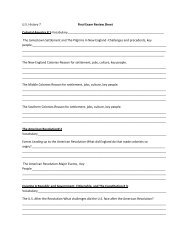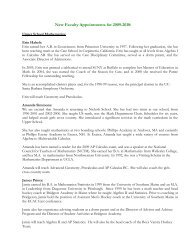Ms. Aranya Maritime, Head of Upper School ... - Nichols School
Ms. Aranya Maritime, Head of Upper School ... - Nichols School
Ms. Aranya Maritime, Head of Upper School ... - Nichols School
Create successful ePaper yourself
Turn your PDF publications into a flip-book with our unique Google optimized e-Paper software.
<strong>Ms</strong>. <strong>Aranya</strong> <strong>Maritime</strong>, <strong>Head</strong> <strong>of</strong> <strong>Upper</strong> <strong>School</strong>Monday, December 7, 2007.On Language and HarassmentIt is not easy to know what the person next to you is thinking or feeling. Some mightsuggest that you cannot ever really know, even if someone tells you how he or she feels.Words fall short <strong>of</strong> being able to express what we want and feel. Often language servesmore to hinder communication than to facilitate it.In Frost’s poem “Home Burial” the husband who has just buried his child himself comesinside and says, “Three foggy mornings and one rainy day/Will rot the best birch fence aman can build.” His wife reproaches him because she cannot believe that he can think <strong>of</strong>rotting wood at a time when their child has just been placed in the grave. Now if we thinkabout the husband’s words, he is talking about death and decay and the futility <strong>of</strong> trying tocreate things when death comes to take them away. But the wife does not hear it in this waybecause her mind is elsewhere. She is hurt by his remarks and the poem ends as sheattempts to flee from the house.Miscommunication is everywhere in literature. Often we see it illustrated as a missed letter –a missed communication -- in Romeo and Juliet the tragedy results on one level because aletter does not make it on time. Surely we all see that this missed letter can be readmetaphorically to represent all the missed communication in the play. (If you need anotherexample we see it again in Tess <strong>of</strong> the d’Urbervilles.)I bring this up because I think it is important to remember that your words may not beheard in the way you intend them to be received. Because you cannot know what the personnext to you has in his head, you cannot assume that the joke you have just told at hisexpense will be heard as a joke by him. Does this make the world a difficult place to live in?Does it mean you have to think about what you say? Does it mean that you cannot bulldozethoughtlessly through your day running down everyone in your path?The answer to each <strong>of</strong> these questions is yes. When you were little children, doubtless theworld seemed a much simpler place. This was because you had undeveloped minds and theycouldn’t think on abstract, complex levels. I think this is the root <strong>of</strong> what I like to call thenostalgia fallacy – we look back and like to think that times were better because they weresimpler when we were little. But in reality it wasn’t the times that were simpler, we weresimpler. As you age and your minds become more capable <strong>of</strong> complex reasoning, we expectthat you will use your minds.Part <strong>of</strong> growing up is beginning to understand that you need to act differently in differentspheres – in other words, you can say and do things in your living room with your family,that are not acceptable to say and do in public. And this school is a public place. If Iwanted to speculate about why some <strong>of</strong> you have trouble seeing this space as public, I mightsay it could have something to do with the internet, and the way you are willing to say thingsthere because you are typing them in the privacy <strong>of</strong> your home – so the public realm getsconfused with the private realm. But then again, I have a feeling that even before theinternet, a key part <strong>of</strong> growing up was learning to act a certain way in public. Now some <strong>of</strong>
you may object that this is hypocritical – and I would answer that I would hope that youwould be kind both in private and public. Then there would be no need to “act” a certainway when you are out <strong>of</strong> your house. Comedian Dave Chappelle does a great skit about thisidea when he explores the concept <strong>of</strong> “keeping it real” – he shows that there are times whenit is not acceptable to “keep it real” – if “being real” to you involves saying or doing thingsthat are hurtful to others.If you feel bad because <strong>of</strong> what others in this community say or do to you, I urge you to talkto an adult.If you talk to someone here, we will listen and a process will begin. Many <strong>of</strong> you know thatI coach Mock Trial and that I, along with all the other adults here, value the rule <strong>of</strong> law anddue process. What are the rule <strong>of</strong> law and due process? Well, in some ways these thingsrefer to the systems we put into place to ensure that students get a fair hearing based on arational process rather than an emotional response.If you bring a complaint to an adult on this campus, we will begin to have conversationswith the people involved, and based on those conversations, Mr. McCarthy and I will decideupon a next step. This next step might involve a conversation, a counselingrecommendation, a discipline response from us, or a recommendation that the case be heardby a committee. We have two committees – the minor discipline committee and the studentconduct committee. The MDC hears cases involving skipped detentions, repeated latenessto school or class, etc. The SCC hears major cases <strong>of</strong>ten involving honor code violations –plagiarism, theft, harassment, substance use, etc.The SCC is made up <strong>of</strong> both students and faculty, and currently has more student votingmembers than faculty. The student members are nominated by you, and they represent yourvoice on the committee. When a case appears before the SCC, the SCC has several options.One <strong>of</strong> these options is to rule that there is no case. Other responses range from warningstatus to expulsion. The results <strong>of</strong> a hearing vary from individual case to case. There is nomagic formula that predicts what the recommendation from the committee will be. Theylisten carefully and base their responses in part on what they have heard, in part on previouscases and responses, and in part on your grade level – we expect more from seniors than wedo from freshmen because seniors have been a part <strong>of</strong> this community for more time thanfreshmen and they know better what is expected and they should serve as models <strong>of</strong> thisexpected behavior.Finally, please know that if you come to talk to an adult about feeling harassed, you will nothave to testify before the SCC.It is my hope that no one here is malicious. I would rather believe that sometimes people donot understand how their comments or actions may be heard and felt by another member <strong>of</strong>this community. I stress again that there is no way to truly know how another person willrespond to something you may perceive as a joke or as harmless teasing. As you strive toestablish meaningful relationships with one another, take the time to consider how you maybe heard, and if you say or do something that <strong>of</strong>fends, don’t hesitate to apologize. We haveall said things that we wish to retract. Part <strong>of</strong> becoming an adult is being able to understandand to say that you were wrong.


